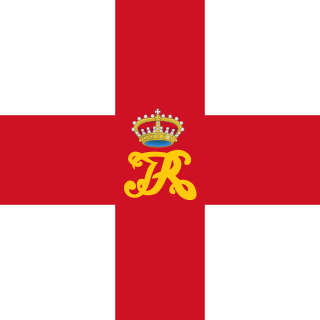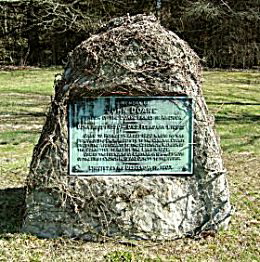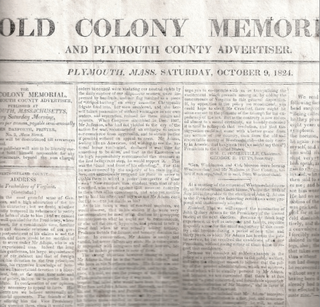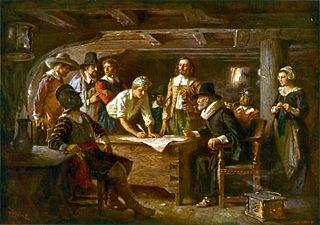
The Massachusetts Bay Colony was an English settlement on the east coast of America in the 17th century around the Massachusetts Bay, the northernmost of the several colonies later reorganized as the Province of Massachusetts Bay. The lands of the settlement were located in southern New England, with initial settlements situated on two natural harbors and surrounding land about 15.4 miles (24.8 km) apart—the areas around Salem and Boston.

Plymouth Colony was an English colonial venture in America from 1620 to 1691 at a location that had previously been surveyed and named by Captain John Smith. The settlement served as the capital of the colony and developed as the town of Plymouth, Massachusetts. At its height, Plymouth Colony occupied most of the southeastern portion of Massachusetts.

Francis Cooke was a Leiden Separatist who came to America in 1620 on the Pilgrim ship Mayflower and a signer of the Mayflower Compact.

The Dominion of New England in America (1686–89) was an administrative union of English colonies covering New England and the Mid-Atlantic Colonies. Its political structure represented centralized control similar to the model used by the Spanish monarchy through the Viceroyalty of New Spain. The dominion was unacceptable to most colonists because they deeply resented being stripped of their rights and having their colonial charters revoked. Governor Sir Edmund Andros tried to make legal and structural changes, but most of these were undone and the Dominion was overthrown as soon as word was received that King James II had left the throne in England. One notable change was the introduction of the Church of England into Massachusetts, whose Puritan leaders had previously refused to allow it any sort of foothold.
Thomas Graunger or Granger was one of the first people hanged in the Plymouth Colony and the first known juvenile to be sentenced to death and executed in the territory of today's United States. He was a servant to Love Brewster, of Duxbury, in the Plymouth Colony of British North America. Graunger, at the age of 16 or 17, was convicted of "buggery with a mare, a cow, two goats, divers sheepe, two calves, and a turkey", according to court records of 7 September 1642.
During the American colonial period, a freeman was a person who was not a slave. The term originated in 12th-century Europe.

Richard Warren was one of the passengers on the Pilgrim ship Mayflower and a signer of the Mayflower Compact.

George Soule was a colonist who was one of the indentured servants on the Mayflower and helped establish Plymouth Colony in 1620. He was one of the signers of the Mayflower Compact.
Thomas Prence was an English born colonist who arrived in the colony of Plymouth in November 1621 on the ship Fortune. In 1644 he moved to Eastham, which he helped found, returning later to Plymouth. For many years, he was prominent in Plymouth colony affairs, and was colony governor for about twenty years, covering three terms.

Edward Doty was a passenger on the 1620 voyage of the Mayflower to North America; he was one of the signers of the Mayflower Compact.

John Doane was a politician in English Colonial North America. He arrived in Plymouth Colony on an unknown ship sometime between 1628 and 1632. During his long life he is considered a person of note in Plymouth Colony serving in many government capacities associated with the colony government, such as government committees and deputy for Plymouth as well as Assistant Governor in 1632/33. He left government service for a time in the 1630s to serve as deacon in the Plymouth Church.

The Mayflower was an English ship that transported the first English Puritans, known today as the Pilgrims, from Plymouth, England to the New World in 1620. There were 102 passengers, and the crew is estimated to have been about 30, but the exact number is unknown. The ship has become a cultural icon in the history of the United States. The Pilgrims signed the Mayflower Compact prior to leaving the ship and establishing Plymouth Colony, a document which established a rudimentary form of democracy with each member contributing to the welfare of the community. There was a second ship named Mayflower which made the London to Plymouth, Massachusetts voyage several times.

The Plymouth General Court was the original colonial legislature of the Plymouth colony from 1620 to 1692. The body also sat in judgment of judicial appeals cases.

Henry Samson In 1620 Henry Samson travelled as a member of the Edward Tilley family on the historic voyage of the Pilgrim ship Mayflower. The Tilleys died in the first winter but Henry Samson survived to live a long, fulfilling life in Plymouth Colony.

The Massachusetts Environmental Police is a Massachusetts, US, state government law enforcement agency, which is the primary enforcement agency of Massachusetts's boating and recreation vehicle laws and regulations and is responsible for registering boats, off-highway vehicles and snowmobiles in Massachusetts. The agency is also responsible for the enforcement of fish and game laws, including commercial and recreational harvesting of the living marine resources along the state's coastline.

The Old Colony Memorial (est.1822) is a semiweekly newspaper published in Plymouth, Massachusetts. Gannett owns the paper; previous owners include the George W. Prescott Publishing Co. and the Memorial Press Group.
In 1623 the ships Anne and Little James were the third and fourth ships financed by the London-based Merchant Adventurers to come out together in support of Plymouth Colony, as were Mayflower in 1620 and Fortune in 1621. Anne carried mostly passengers, and the much smaller Little James carried primarily cargo, albeit with a few passengers. After a stormy three-month voyage from London, Anne arrived at New Plymouth in early July 1623, with Little James a week or so later.
Also see: The ships Anne and Little James

The Mayflower Compact was an iconic document in the history of America, written and signed aboard the Mayflower on November 11, 1620 while anchored in Provincetown Harbor in Massachusetts. The Compact was originally drafted as an instrument to maintain unity and discipline in Plymouth Colony, but it has become one of the most historic documents in American history. It was published in London in Mourt's Relation in 1622, and the authors had added a preamble to clarify its meaning: "it was thought good there should be an association and agreement, that we should combine together in one body, and to submit to such government and governors as we should by common consent agree to make and choose."
John Holmes, gentleman, was an early settler and official of the Plymouth Colony who arrived there before late 1632. He served as Messenger of the Court of Plymouth from 1638 to 1645 or later, and in that office carried out one of the first executions in the colony.








